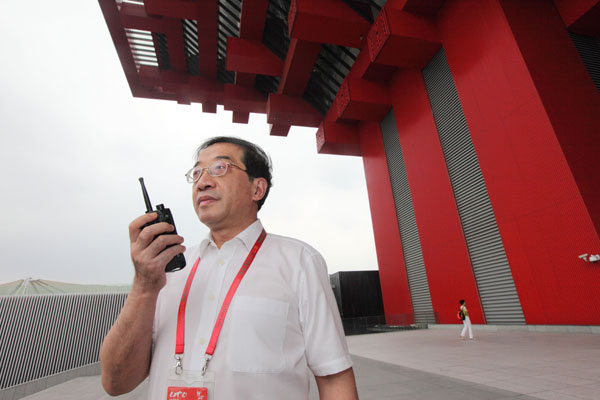Profiles
Upholding the image of the nation
By Wang Zhenghua (China Daily)
Updated: 2010-09-30 06:49
 |
Large Medium Small |
 |
|
Qian Zhiguang, deputy head of the China Pavilion at the Expo 2010 Shanghai, stands by the pavilion on Sept 15. [Gao Erqiang/China Daily] |
SHANGHAI - Qian Zhiguang has been getting an earful from his wife lately.
She became a bit ticked off after Qian, deputy head of the China Pavilion, didn't use his influence to give her easy access to the top attraction at the Expo 2010 Shanghai.
Like the tens of thousands of people every day who wish to see the Crown of the East, Qian's wife had to line up early in the morning for a reservation voucher.
Due to the limited number of vouchers, she had to line up three times to get one.
"I can't open a back door for my relatives, otherwise my staff would follow suit," Qian explained, setting an example for his subordinates and building a disciplined team.
Qian, 57, has worked as the executive deputy director of the China Pavilion since early last year, when he said goodbye to a less pressured life as a Party leader at the Shanghai Science and Technology Museum.
One of the tens of thousands of people serving the extravagant fair every day, Qian has been working more than 10 hours a day, seven days a week, since he joined the Expo team.
And he will probably work during the National Day holiday, when the China Pavilion holds its pavilion day.
"Throughout the China Pavilion's growth from a sketch on paper to a landmark of Shanghai, I never felt my job was relaxing," Qian said.
"Time is pressing and my team is new," he continued. "At the China Pavilion, every day is a new beginning with a new batch of visitors."
More than anything, the China Pavilion is the public face of the host country and every detail about it is placed under a spotlight.
With a designed capacity for about 50,000 people per day, only one in 12 had a chance to get in when daily visitors topped 600,000 on Sept 23.
The pavilion expects to receive 9 million visitors during the 184 exhibition days, roughly equivalent to the population of Sweden.
Representing China's economic miracle over the past 30 years, especially its achievements in urban development, the pavilion is a must-see for visiting foreign dignitaries and state leaders.
Even scalpers try to profit by trading reservation vouchers, one of the most sought-after items in the Expo Garden.
Yet Qian is accustomed to the pressure and his job is mainly about taking care of the more than 50,000 daily visitors.
"One of the most important pieces of 'homework' after the pavilion closes each day is analyzing visitors' complaints and seeking solutions," Qian said.
For instance, drinking water faucets were added after visitors complained it was hard to find drinking water in the pavilion.
Qian also came up with the idea of a "gathering point" in the structure, which helps missing group members find each other.
It doesn't require a lot of wisdom, Qian said. "But you have to have a heart for visitors. I thought about solutions and improvements for a better visiting experience even in my dreams."
Qian said he was glad to see the design and operation of the China Pavilion meet the public's expectations.
"Surveys show that the China Pavilion is one of the most popular structures at the Expo," Qian said.
Qian also defended the Expo against those who questioned its necessity in the era of the Internet when people can easily grab information from the Web.
"It's like the difference between a pocketbook and a movie," Qian said. "You cannot get the knowledge in such a real way and by combining many forms of art and technology without the Expo."
He cited the scroll Along the River During the Qingming Festival, the centerpiece of the China Pavilion, as an example.
The modern version of the giant painting by Song Dynasty artist Zhang Zeduan (AD 1085-1145) was projected as a three-dimensional image on a digital screen measuring 100 meters by 6 meters.
"It's something you can't appreciate in a textbook or on the Internet," Qian said.